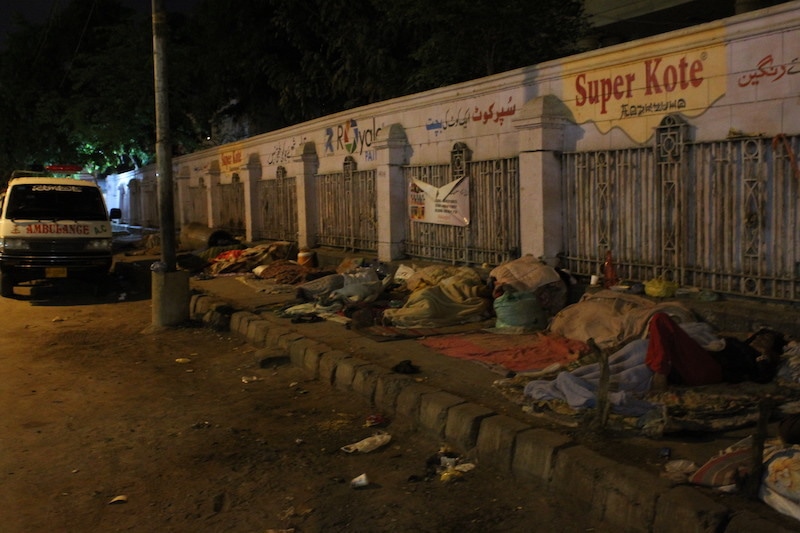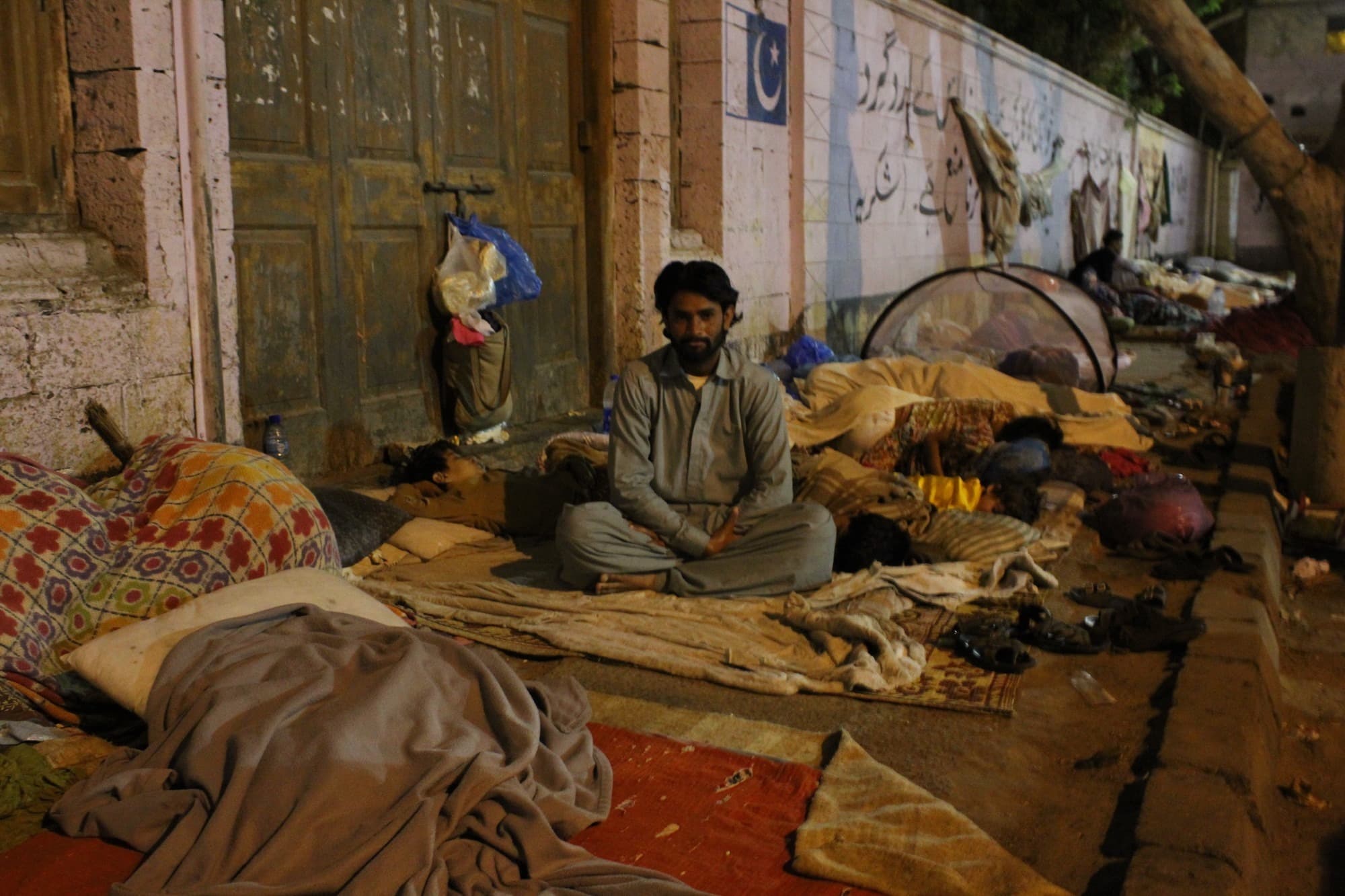Corona or no corona, these patients in need of dialysis have no choice but to live on Karachi's streets
For the past five years, Shaukat Ali has made the footpath opposite the tall, imposing structure of the Sindh Institute of Urology and Transplantation (SIUT) his home.
Five years ago, Ali’s aunt, whose name he refused to give, developed a kidney-related ailment. Though he didn’t know the medical term for the disease, Ali explained that one of her kidneys had stopped functioning, which is why she needed dialysis at least once a week.
Ever since, Ali has been living on and off with his aunt and her five young children on the footpath. The eldest is 13 years old and the youngest four years old.
Lockdown? What lockdown?
Even as the whole country has gone into lockdown in a bid to prevent the spread of the coronavirus, dozens of patients and their attendants still sleep on the streets with no regard for the much-touted ‘social distancing’ measures. The dialysis procedures are like oxygen to them — they don’t stand a chance without them, they’ve been told.

“It takes a whole day and a night to travel to Jaffarabad. And each ticket costs Rs1,600 to Rs1,700. Neither do we have that kind of money nor is it feasible to travel back and forth every week for the dialysis,” he explains, dismissively.
They were supposed to go back home for a visit two weeks ago but the lockdown was put in place. It would've been Ali's uncle's turn to come to Karachi now and he would have stayed home for a few weeks.
Jaffarabad is a district in Balochistan, located on the border with Sindh. It is an eight-hour journey by road, but a passenger bus takes almost thrice the time.
The family has gotten used to life on the streets. The children have even enrolled in a nearby school. “It’s closed now because of this virus everyone keeps talking about, but they’ve been going to school regularly.” The children’s mother has even made arrangements with one of SIUT’s security guards, who keeps their uniforms in storage.

For food, they visit the stall of any one of the charity organisations nearby thrice a day. More difficult is finding a place to relieve oneself, which is mostly on a quiet street corner hidden from view, says Ali.
During the day, Ali goes to find work on construction sites while his aunt tends to the children. They don't stay on the footpath during the day. It gets too hot and the road is quite busy so they find a shaded spot in one of the adjoining streets, as long as the residents don't shoo them away. At night, they return to claim their space on the footpath.
“It was difficult to adjust to life on the streets at first,” he says, his voice faint as he recaps his experience. “But my aunt needs the dialysis and at least she has the children with her.”
As he speaks, the aunt and children are fast asleep next to him, their faces covered with chaddors to protect themselves from mosquitoes and other bugs. “That’s the worst — mosquitoes. That and the stench.” The area stinks of urine and overflowing garbage, strewn about along the side of the road and in the nearby garbage dump. Ali says he never really got used to it.
Home away from home
Ali’s story is similar to that of dozens of others who have been forced to make the footpath their semi-permanent abode. They line the footpath, covered by blankets and chaddors every night, invisible to the commuters and passers-by who race past.
They are all attendants of patients like Ali’s aunt. Many of these patients need the dialysis procedure twice or even thrice a week.
According to the SIUT website, the institute carries out 990 dialysis procedures every day. The procedures are performed free-of-cost, but it comes with a price tag — the hospital is so busy that it doesn’t allow any attendant to stay with the patient.
Many of these patients come from outside Karachi. Most don’t have any accommodation in the city. The trouble is, it is these patients who are the most immunocompromised, meaning their immune systems are weaker than most human beings.
Daud Lashari, 25, is one such patient. He has a tube protruding from his neck and is sitting upright, failing miserably at his attempts to squat as many mosquitos as he can. When approached, he looks up with tired-looking eyes, a frown on his face.
“It doesn’t matter how many I kill. Thousands more attack the minute I stop waving about,” he says, the frustration audible in his tone.

Lashari was supposed to get his first regular dialysis, but he mixed up the dates and arrived a day earlier. “Now I must sleep here,” he says, looking angrily at an older man, who introduces himself as Lashari’s uncle, Rajab Ali.
Rajab and Lashari have come from Daro village in district Sujawal — a four-hour drive from Karachi. They came in an ambulance of the Sindh Rescue and Medical Services, operated by the Aman Foundation. The travel doesn’t cost them anything but it takes a toll on Lashari’s frail health, whose both kidneys have failed.
But why come all the way when they could’ve easily gone to one of the medical facilities closer to their home?
Why SIUT
SIUT claims to operate by the motto: “Healthcare for all, with dignity and compassion”.
Inside the facility, walls are adorned with posters in several languages, warning about the dangers of the coronavirus and tips to maintain self-hygiene.
On the fifth floor, the institute’s founder and one of the country’s most-renowned philanthropists, Dr Adibul Hasan Rizvi, sits on a sofa, dressed in green scrubs. His face is covered by a mask, voice barely audible from behind it.
“Why should they need to come here?” he questions when asked about the patients and their attendants sleeping outside.
“Why can’t there be a hospital built near Jaffarabad or in every district so that patients can get treatment with dignity?” he continues, adding that the SIUT’s Sukkur facility was a model that could be replicated across the country.
For Rajab, the SIUT offers one thing that other medical facilities don’t. “They treat you with dignity and give the best care, all for free,” he remarks. And if that means living on the footpath for a few nights, so be it.
'Forgive me’
But Dr Rizvi is particularly worried about the potential devastation that the coronavirus may cause in Pakistan if it continues to spread. “I want to apologise to the public. We [SIUT] were too late in starting our operations to fight the coronavirus,” he says, before being asked about corona-related measures.
Dr Rizvi and his team had initially thought that other medical facilities, better equipped to deal with the virus, would take the lead in the fight against it. “But when I saw reports of a private hospital shutting its doors on patients, I couldn’t not act anymore.”
They soon set up a helpline, a walk-in screening and testing facility and even an isolation ward for patients with severe symptoms. Initially, they asked friends and friends of friends to bring testing kits in their luggage when they came from abroad. Dr Rizvi didn’t share details of the friends or which countries they brought the kits from.

“The Sindh government has helped us a lot too,” he added.
As of April 14, SIUT had screened over 5,030 suspected patients, of whom 619 were tested for the virus. Of these, 154 had tested positive, the majority of whom were “advised and counselled for home-isolation”, according to a statement issued by the institute.
Besides, seven patients were admitted to the isolation ward, while six others were on ventilator in the Intensive Care Unit. Three others, who were on ventilator, were discharged after their condition improved and they tested negative for the virus.
Taking notice
Reached for comment regarding the plight of the patients and their attendants outside the institute, the Sindh health department referred the matter to the respective deputy commissioner (DC), saying it fell under his domain.
South DC Irshad Sodhar said he had no knowledge of the matter. “Now that you have brought it into my notice, I will look into it,” he told Dawn.com.

Dr Rizvi once famously said: “We can’t let them die if they can’t afford to live.”
For the patients and their attendants outside the centre, the hope to live another day keeps them there.
“And if it means living without a roof over our head some days, so be it,” says Rajab. He’s not even worried about the coronavirus. He just hopes the mosquitos and other bugs don’t get him first.






